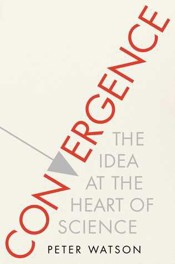Convergence: The Idea at the Heart of Science

I really shudder at the thought of what it took to write this book. There’s just so much here. It’s a comprehensive history of science in the 20th century, and even earlier.
The basic idea is that the science seek to converge. There’s a movement in the scientific community to get scientific disciplines to overlap.
For instance, if we were discover that some number of photons or neutrons in some related series of atoms followed the Fibonacci Sequence, then that would “converge” the fields of physics and mathematics. If we can find a chemical basis for a psychological disorder, then that converges psychiatry and biology. The idea is that we keep finding these overlaps between scientific fields, and this links them together in what scientists hope will be a Grand Unified Theory of the Universe.
I picked up this book because I was curious if there was a religious aspect to it all. If you’re looking for some Grand Unified basis for the universe, I can’t help but think there’s some aspect of God there. I didn’t find that in this book.
What I did find were a lot of names. Every major scientist you have ever heard of is in this book, and their work is covered to a pretty pleasing depth – just deep enough so you know what they did, but not deep enough that you need to understand it.
But the book jumps around it a lot. It’s divided into parts, which I didn’t understand, and the chapter titles are in the format like “Field 1 + Field 2 + Field 3 = Something.”
So, a mixed bag. Not terrible, but unless you love science history, I don’t know if this is a book that will hold your interest.
Book Info
- I have read this book. According to my records, I completed it on .
- A hardcover copy of this book is currently in my home library.